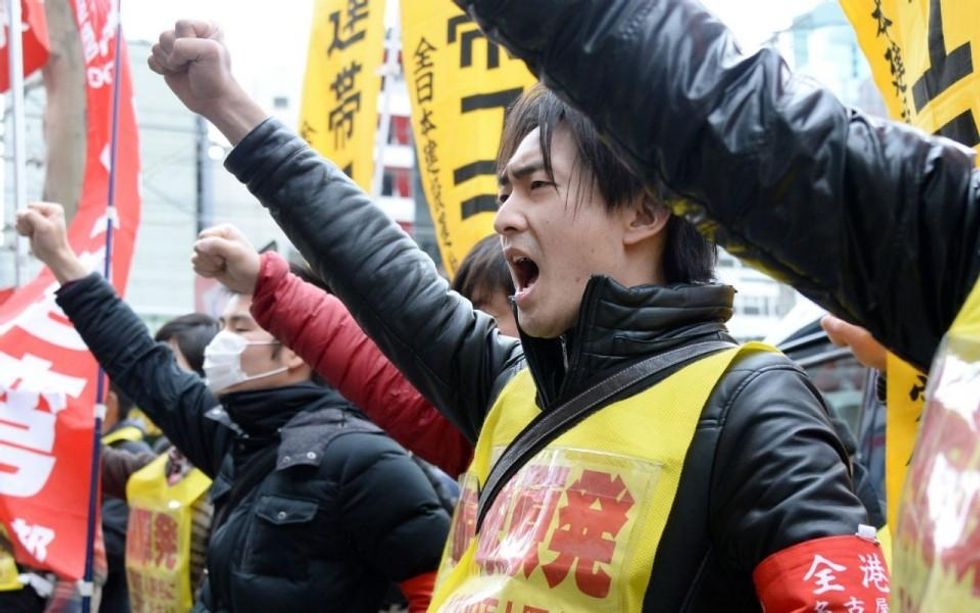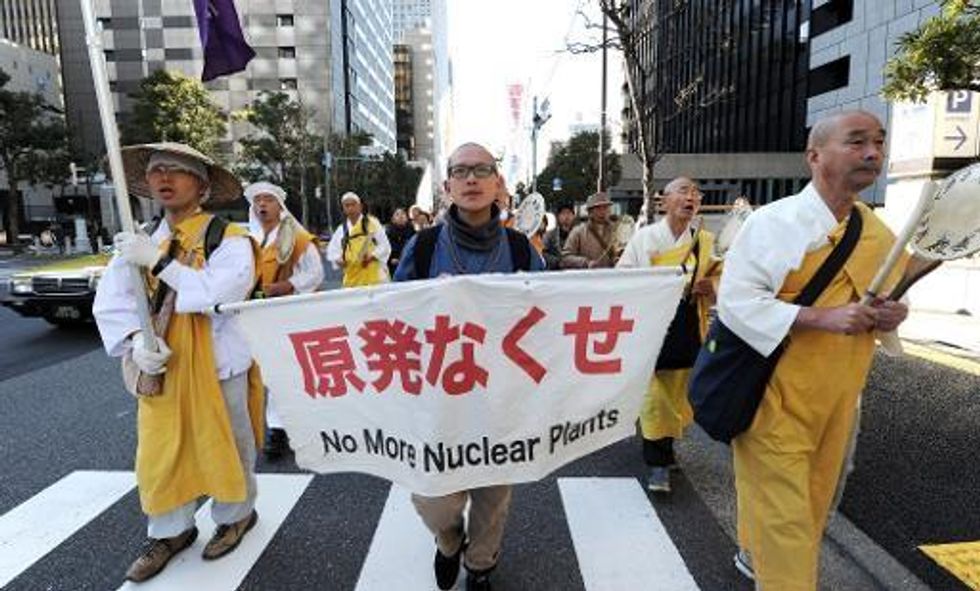

SUBSCRIBE TO OUR FREE NEWSLETTER
Daily news & progressive opinion—funded by the people, not the corporations—delivered straight to your inbox.
5
#000000
#FFFFFF
To donate by check, phone, or other method, see our More Ways to Give page.


Daily news & progressive opinion—funded by the people, not the corporations—delivered straight to your inbox.

The protest comes shortly after the three-year anniversary of Japan's March 2011 earthquake and tsunami that led to the meltdown of fuel-rods at several reactors at the Fukushima nuclear plant, prompting the worst nuclear disaster the world has seen since Chernobyl. The plant continues to leak radiation, and neither owner TEPCO or the Japanese government have offered a clear plan for stabilization.
"We have to seriously think about whether nuclear power is a good idea for Japan," said protester Masatoshi Harada, quoted by AFP. "This is an opportunity for Japan to drop nuclear power."
In addition to Saturday's march, Fukushima cleanup workers demonstrated at the headquarters of TEPCO on Friday to protest dangerous working conditions and poor wages, Al Jazeera and AFP report. A similar worker protest took place Friday outside Maeda Corp, one of the contractors hired to cleanup the ravaged plant.
Since the 2011 Fukushima disaster, Japan's commercial nuclear reactors have been halted. Yet, Prime Minister Shinzo Abe recently vowed to shift course and start the process of re-opening the country's commercial nuclear reactors. Regulators are currently deliberating whether to permit the restart two reactors at Kyushu Electric Power's Sendai power plant.
Saturday's rally follows protests of tens of thousands in cities across Japan last weekend to demand the government say no to nuclear power.

_____________________
Dear Common Dreams reader, The U.S. is on a fast track to authoritarianism like nothing I've ever seen. Meanwhile, corporate news outlets are utterly capitulating to Trump, twisting their coverage to avoid drawing his ire while lining up to stuff cash in his pockets. That's why I believe that Common Dreams is doing the best and most consequential reporting that we've ever done. Our small but mighty team is a progressive reporting powerhouse, covering the news every day that the corporate media never will. Our mission has always been simple: To inform. To inspire. And to ignite change for the common good. Now here's the key piece that I want all our readers to understand: None of this would be possible without your financial support. That's not just some fundraising cliche. It's the absolute and literal truth. We don't accept corporate advertising and never will. We don't have a paywall because we don't think people should be blocked from critical news based on their ability to pay. Everything we do is funded by the donations of readers like you. Will you donate now to help power the nonprofit, independent reporting of Common Dreams? Thank you for being a vital member of our community. Together, we can keep independent journalism alive when it’s needed most. - Craig Brown, Co-founder |

The protest comes shortly after the three-year anniversary of Japan's March 2011 earthquake and tsunami that led to the meltdown of fuel-rods at several reactors at the Fukushima nuclear plant, prompting the worst nuclear disaster the world has seen since Chernobyl. The plant continues to leak radiation, and neither owner TEPCO or the Japanese government have offered a clear plan for stabilization.
"We have to seriously think about whether nuclear power is a good idea for Japan," said protester Masatoshi Harada, quoted by AFP. "This is an opportunity for Japan to drop nuclear power."
In addition to Saturday's march, Fukushima cleanup workers demonstrated at the headquarters of TEPCO on Friday to protest dangerous working conditions and poor wages, Al Jazeera and AFP report. A similar worker protest took place Friday outside Maeda Corp, one of the contractors hired to cleanup the ravaged plant.
Since the 2011 Fukushima disaster, Japan's commercial nuclear reactors have been halted. Yet, Prime Minister Shinzo Abe recently vowed to shift course and start the process of re-opening the country's commercial nuclear reactors. Regulators are currently deliberating whether to permit the restart two reactors at Kyushu Electric Power's Sendai power plant.
Saturday's rally follows protests of tens of thousands in cities across Japan last weekend to demand the government say no to nuclear power.

_____________________

The protest comes shortly after the three-year anniversary of Japan's March 2011 earthquake and tsunami that led to the meltdown of fuel-rods at several reactors at the Fukushima nuclear plant, prompting the worst nuclear disaster the world has seen since Chernobyl. The plant continues to leak radiation, and neither owner TEPCO or the Japanese government have offered a clear plan for stabilization.
"We have to seriously think about whether nuclear power is a good idea for Japan," said protester Masatoshi Harada, quoted by AFP. "This is an opportunity for Japan to drop nuclear power."
In addition to Saturday's march, Fukushima cleanup workers demonstrated at the headquarters of TEPCO on Friday to protest dangerous working conditions and poor wages, Al Jazeera and AFP report. A similar worker protest took place Friday outside Maeda Corp, one of the contractors hired to cleanup the ravaged plant.
Since the 2011 Fukushima disaster, Japan's commercial nuclear reactors have been halted. Yet, Prime Minister Shinzo Abe recently vowed to shift course and start the process of re-opening the country's commercial nuclear reactors. Regulators are currently deliberating whether to permit the restart two reactors at Kyushu Electric Power's Sendai power plant.
Saturday's rally follows protests of tens of thousands in cities across Japan last weekend to demand the government say no to nuclear power.

_____________________